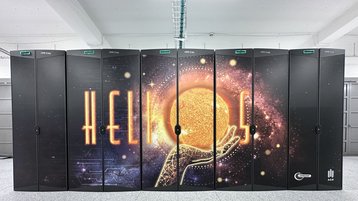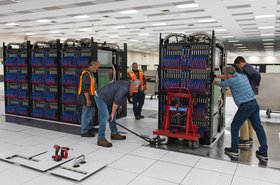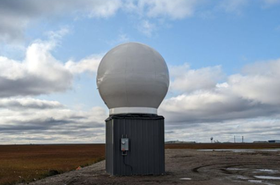HPE is building a supercomputer for the Academic Computer Centre Cyfronet at the Akademia Górniczo-Hutnicza (AGH) the University of Krakow, Poland.
Helios is Cyfronet's fifth-generation supercomputer and will be the fastest system in the eastern European nation.
The supercomputer delivers a theoretical peak performance of 35 petaflops and 1.8 exaflops of peak AI performance, making it over four times faster than CYFRONET’s previous flagship system. It also uses direct liquid cooling to reduce energy consumption.
Based on the HPE Cray EX architecture, the supercomputer features three partitions: one dedicated to traditional computational scientific research, such as computational fluid dynamics; the second is built with Nvidia GPUs to support AI applications and large-scale AI training, such as generative AI; and a third for big data processing, tuning AI models, and AI inferencing.
The first CPU partition is made up of 75,264 Zen 4 cores from 4th Gen AMD Epyc processors and 200 terabytes of DDR5 memory. The GPU partition contains 440 Nvidia GH200 Grace Hopper Superchips and the final INT partition is equipped with 24 Nvidia H100 Tensor Core GPUs and high-speed NVMe local storage.
All components of the supercomputer are interconnected with HPE Slingshot, which provides 200Gbps of high-performance networking.
“For the past 50 years, Cyfronet has been helping advance Polish science, offering its computing capabilities to multiple researchers and institutions so they can achieve more complex and accurate results in a shorter time,” said Professor Kazimierz Wiatr, director of Academic Computer Centre Cyfronet. “To keep doing that, we needed to invest and build the new supercomputer with the most advanced architecture, high compute power, and AI capabilities. The HPE Cray EX supercomputer, used in the world’s fastest clusters, was the right choice.”
In addition to the new Helios machine, Cyfronet also houses the 7.7 petaflops system, Athena, launched in 2022; the Huawei-based Ares, a 3.5 petaflops system launched in 2021; and HPE-based Prometheus, a 2.7 petaflops system, launched in 2015, as well as several smaller clusters.
In other supercomputing news
- E4 Computer Engineering has won a contract to upgrade CINECA Interuniversity Consortium’s Galileo 100 supercomputer and Tier-1 cloud system. As part of the upgrade, E4 Computer will increase the number of vCPUs for VM services by at least 10 times, allowing for improved long-term data storage and interactive processing. The upgraded system will contain Dell PowerEdge HS7710 solutions for CPU nodes and Dell PowerEdge R760xa for GPU nodes, the latter equipped with Nvidia L40s and Nvidia A30 PCIe GPUs.
- The Cosmopolitan University, Abuja, Nigeria, is set to adopt a supercomputer cluster to process satellite data for agricultural research and AI development. In order to make the system as environmentally friendly as possible, the system will be housed in a carbon-neutral facility that uses solar panels, heat exchange systems, and thermo-electric generation. No technical information about the specifications of the machine has been released.






